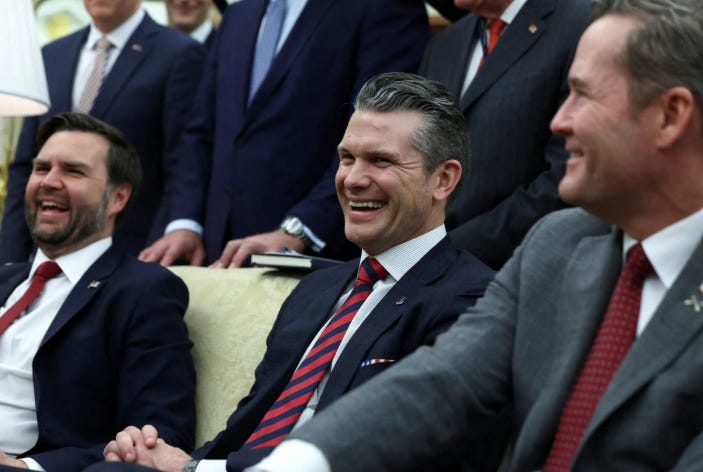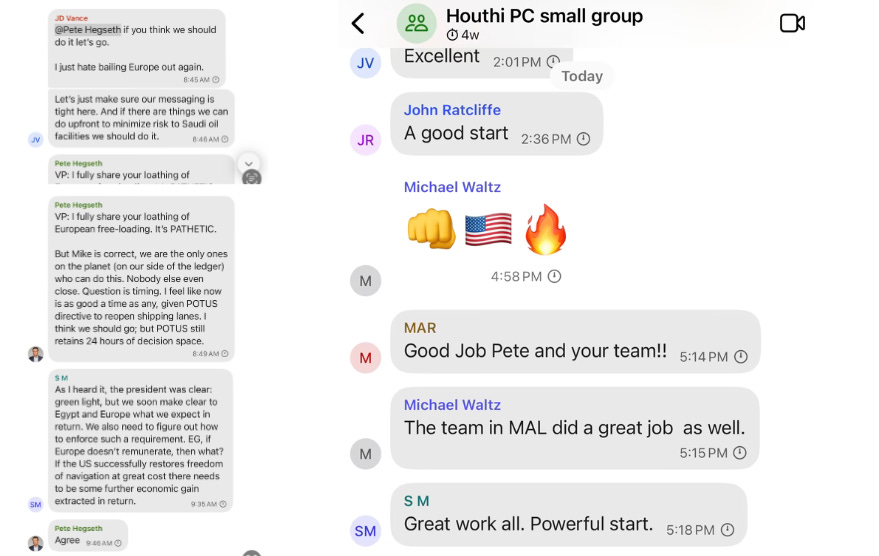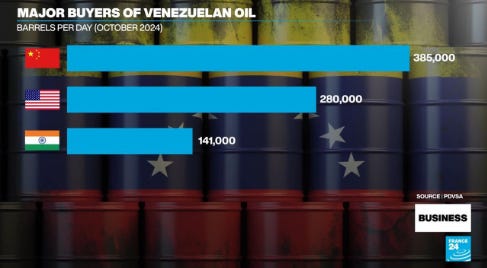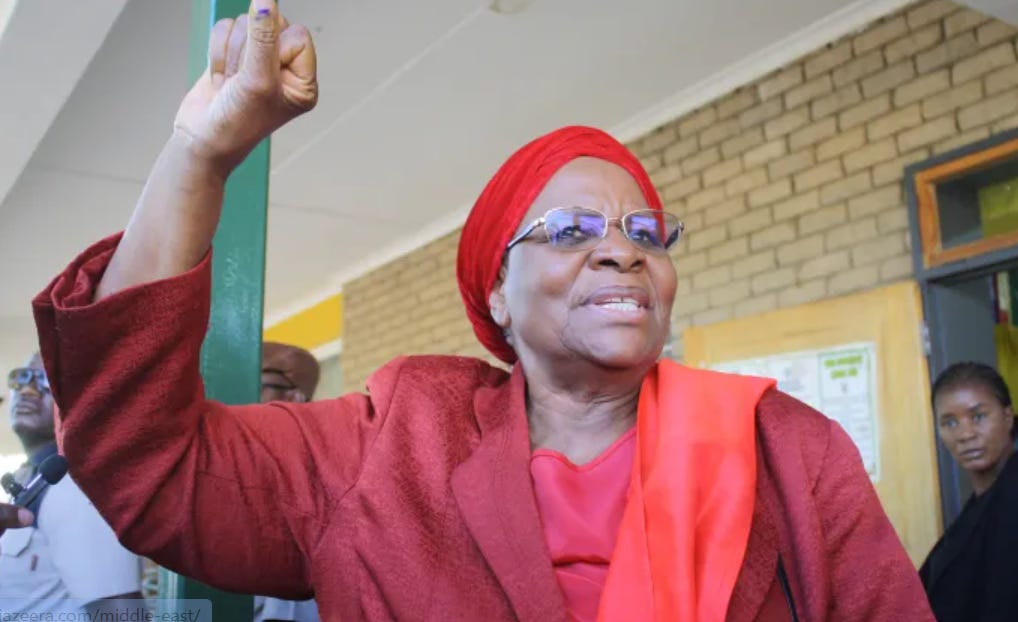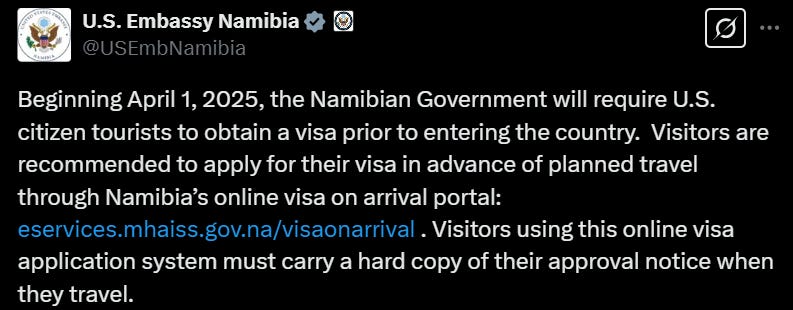Russia Demands Sanction Relief, US Levies Tariffs on Venezuela Oil Buyers, US Signal Chat Intel Fiasco, Namibia Imposes New Visa Requirements, EU Issues Stark Warning, and More
Mid Week Chaos, Mid Week Opportunities
A lot of drama is unfolding on the geopolitical scene right now. Russia has conditioned the Black Sea maritime ceasefire on the lifting of sanctions, including SWIFT access and agricultural trade restrictions. A major US security lapse emerged when senior officials sloppily included a journalist in a Signal chat group intended to coordinate military strikes on the Houthis, causing a huge uproar in Washington, D.C., as the president called it a ‘glitch’ and opponents are demanding heads to roll. Washington is also imposing a 25% tariff on Venezuelan oil buyers. Meanwhile, Namibia is ending visa-free travel for US citizens beginning April 1, citing reciprocity. Tensions are rising in East Africa, with Burundi’s president accusing Rwanda of plotting an attack—claims Kigali denies. In Europe, expected US trade tariffs on energy, tech, and agriculture have left several countries on edge, with Germany and France stockpiling resources and the EU issuing calls for residents across the continent to keep essential food supplies amid warnings of extreme disruptions as April 2 approaches. But the market seems buoyed by speculations that the tariffs might be narrower than anticipated.
It’s best to describe the environment as both grim and galvanizing, but our core mission remains unchanged: turning uncertainty into opportunity for you, leveraging geostrategic and politico-economic shifts to help you make smarter, more informed decisions.
Mid-week chaos, but big mid-week opportunities!
But first, a bit of humor 😄 to lighten what appears to be another tough week!
"He who feeds you, controls you."
Thomas Sankara, Speech at the United Nations General Assembly, New York, October 4, 1984. Quoted in Thomas Sankara Speaks: The Burkina Faso Revolution 1983–1987, edited by Samantha Anderson, translated by Pathfinder Press, 1988, p. 142.
Disclaimer: The opinion expressed in this quote does not represent our views but is intended for reflection purposes only.
From Grinfi Political Risk Observatory (GPRO), here’s what we’re monitoring:
High Impact Situational Updates
- Senior US Official Discuss Planned Military Strikes Over Signal
On March 24, a political firestorm shook Washington when journalist Jeffrey Goldberg published an article exposing a major US operational security blunder. Goldberg had been mistakenly invited by National Security Advisor Mike Waltz to a Signal chat group (Houthi PC small group), where top US officials were planning and coordinating the March 15 military strikes on the Houthis. The breach, reminiscent of historical security leaks like the 1971 Pentagon Papers, which exposed the Vietnam War's mismanagement, the 1986 Iran-Contra scandal involving Reagan officials’ arms deals with Iran, the 2010 WikiLeaks release of classified Iraq and Afghanistan documents enabled by Chelsea Manning, and the 2016 Hillary Clinton email controversy, exposed sensitive discussions and strategic disagreements. However, unlike those leaks, this breach was not intentional. While the White House confirmed the leak’s authenticity and called it “deep and thoughtful coordination,” critics, including Senate Democratic Leader Chuck Schumer, condemned it as a serious breach. Key officials, including Defense Secretary Hegseth, DNI Director Tulsi Gabbard, and National Security Adviser Mike Waltz, are facing intense scrutiny, although they maintain that no classified information or war plans were discussed.
Trump has defended his team, downplaying the incident as a ‘minor glitch’. NSA Waltz has accepted full responsibility, but questions about accountability are rising as top security leaders face questioning before the Senate Intelligence Committee over what others are calling “Signal Gate.” Moreover, deeper questions have emerged about whether Vance actually trusts Trump’s foreign policy judgment. More on this in our latter edition.
Below are screenshots from the Signal chat room published by Jeffrey Goldberg, editor in chief of The Atlantic, in his revealing article: “The Trump Administration Accidentally Texted Me Its War Plans.”
- Russia Demands Sanction Relief as Precursor to Black Sea Ceasefire Deal
Russia has conditioned the implementation of the U.S.-brokered maritime ceasefire in the Black Sea on the lifting of Western sanctions, complicating peace efforts. The White House confirmed that Russia and Ukraine had agreed to ensure safe navigation and prevent the military use of commercial vessels in the Black Sea, following U.S.-mediated talks in Riyadh. However, the Kremlin emphasized that the ceasefire is contingent on reconnecting Russia’s Agricultural Bank (Rosselkhozbank) to SWIFT, lifting sanctions on agricultural exports, and reducing maritime insurance costs. Ukrainian President Zelensky accused Russia of distorting the ceasefire terms, citing simultaneous drone attacks on Ukrainian infrastructure.
Public skepticism about Russia’s intentions remains. But will the EU budge, or can the US pressure the EU into conceding to these demands, especially now that the EU feels isolated, betrayed, and targeted by its own traditional ally? The reality is that if Russia’s conditions are not met, the ceasefire could collapse, threatening Black Sea shipping lanes and global food security. The stakes are clearly high.
- U.S. Imposes Tariffs on Countries Purchasing Venezuelan Oil
On March 24, President Trump signed an executive order imposing a 25% tariff on imports from countries purchasing Venezuelan oil, targeting nations like China and India, which import the majority of Venezuela’s oil. The policy is geared towards hampering Venezuela’s $10 billion annual oil revenue, with full implementation set for April 2. However, the tariff is expected not to directly affect Chevron’s operations or temporary license to export Venezuelan oil, but is targeted at the country’s (i.e. Venezuela) broader export market. Following the announcement, Brent crude prices rose to $85 per barrel. The tariffs risk driving inflation and disrupting global energy markets, particularly if extended to larger oil markets like Russia.
This move could trigger retaliatory trade measures from Beijing, deepen Venezuela’s reliance on Russia and China, and intensify its aggression toward neighboring oil-producing, U.S.-friendly Guyana. Trump has accused Venezuela of being hostile to the US and its values.
- Namibia Imposes New Visa Requirements
Namibia’s new and first female president, Netumbo Nandi-Ndaitwah, has adopted a tit-for-tat foreign policy approach. The country has imposed new visa requirements for U.S., Chinese, and EU citizens, effective April 1, ending a long-standing visa-free policy. Namibia argues that it will not grant free entry to countries that do not offer reciprocal access to their citizens. This also applies to Germany, the erstwhile colonizer, which, along with other EU countries, has enjoyed visa-free entry.
The new policy affects over 20,000 annual U.S. visitors and more than 180,000 EU visitors. This might trigger a new paradigm shift in the approaches of African nations in responding to the current geopolitical climate. Namibia’s new foreign policy trajectory could extend further and complicate access to key resources like uranium and rare earth minerals. Namibia holds one of the world’s largest reserves of uranium and REEs.
The US Embassy in Namibia tweeted the following:
- Is a Rwanda-Burundi Conflict on the Horizon?
Tensions between Rwanda and Burundi have escalated, raising the possibility of a wider regional conflict in East Africa. On March 25, in an interview with the BBC, Burundi’s President Évariste Ndayishimiye accused Rwanda of planning an attack, stating, “Burundians will not accept to be killed as Congolese are being killed. Burundian people are fighters.” He cited what he described as ‘credible intelligence’. The


